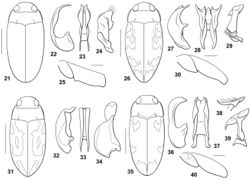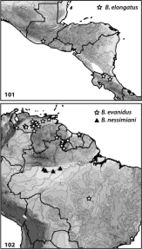Bidessodes elongatus
| Notice: | This page is derived from the original publication listed below, whose author(s) should always be credited. Further contributors may edit and improve the content of this page and, consequently, need to be credited as well (see page history). Any assessment of factual correctness requires a careful review of the original article as well as of subsequent contributions.
If you are uncertain whether your planned contribution is correct or not, we suggest that you use the associated discussion page instead of editing the page directly. This page should be cited as follows (rationale):
Citation formats to copy and paste
BibTeX: @article{Miller2017ZooKeys, RIS/ Endnote: TY - JOUR Wikipedia/ Citizendium: <ref name="Miller2017ZooKeys">{{Citation See also the citation download page at the journal. |
Ordo: ORDO
Familia: FAMILIA
Genus: Bidessodes
Name
Bidessodes elongatus (Sharp, 1882) – Wikispecies link – Pensoft Profile
- Bidessus elongatus Sharp, 1882:25; Blackwelder, 1944;76.
- Bidessus (Bidessodes) elongatus, Zimmermann, 1919: 61; 1921: 200.
- Bidessodes elongatus, Young: 1969: 2.
- Bidessodes (Bidessodes) elongatus, Young, 1986: 216; Biström, 1988: 7; Nilsson, 2016: 98.
Diagnosis
This species does not have a carinate prosternum in either male or female. The prosternal process is somewhat medially longitudinally sulcate, the lateral margins are slightly convergent to the rounded apex. The male mesotibia is unmodified. The male metatrochanter is medially transversely somewhat ridged, but the metafemur is not noticeably modified (Fig. 40). The male abdominal ventrite VI is apically and laterally slightly impressed. The male median lobe is basally moderately broad and apically robust and strongly curved to a narrowly rounded apex (Fig. 36). In ventral aspect it is broad and laterally broadly sinuate with the apex shallowly emarginate with each ramus short and sharply pointed (Fig. 37). The basal segment of the lateral lobe is small and transverse (Fig. 38). The apical segment is formed as a slender stalk basally with a very large, transverse apical lobe that is abruptly curved on the ventral apex (Fig. 39). Specimens are elongate slender with maculate elytra (Fig. 35).
Discussion
Sharp (1882)[1] mentioned that this species, “… will no doubt form a distinct genus.” That eventually proved to be the case as Bidessus elongatus became the type of Bidessodes.
Distribution
The type locality for this species is somewhat ambiguous. The specimens were evidently collected by Champion, but the localities, “Paso Antonio” and “Tortola” are not easily identified today. In a letter from Champion (http://james-champion.com/diary-2012/thursday-14th-june-2012-letter-13th-march-1881/) he mentions the “Rio Michotoya,” which is more easily located, and the star on the map included here reflects that locality (Fig. 101). Known from Guatemala and Costa Rica (Fig. 101).
Taxon Treatment
- Miller, K; 2017: A review of the Neotropical genus Bidessodes Régimbart, 1895 including description of four new species (Coleoptera, Adephaga, Dytiscidae, Hydroporinae, Bidessini) ZooKeys, (658): 9-38. doi
Images
|
Other References
- ↑ Sharp D (1882) On aquatic carnivorous Coleoptera or Dytiscidae. Scientific Transactions of the Royal Dublin Society 2: 179–1003.

